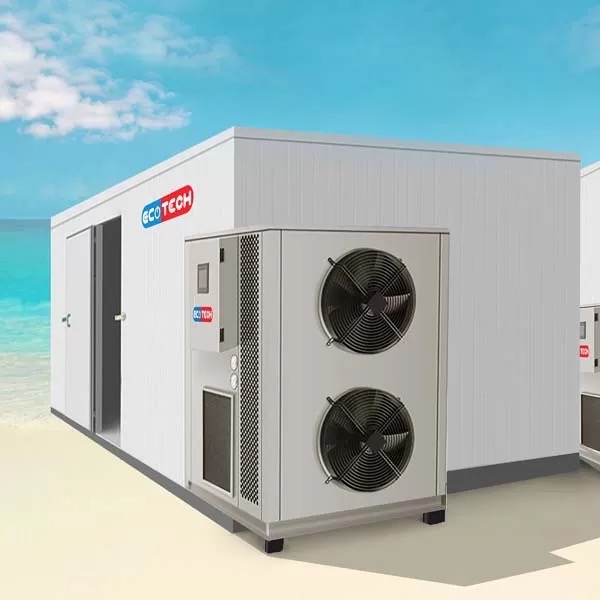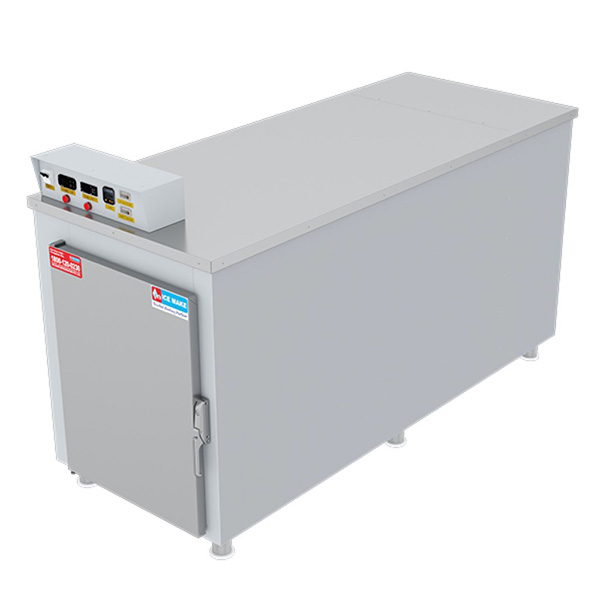
Content Menu
● Introduction
● Understanding Heat Pump Technology in Food Dehydration
● Advantages of Heat Pump Food Dehydrators
>> Energy Efficiency
>> Temperature Control and Product Quality
>> Consistent Drying and Reduced Processing Time
● Applications of Heat Pump Food Dehydrators
>> Fruits and Vegetables
>> Herbs and Spices
>> Meat and Fish
>> Nuts and Seeds
● Industrial Applications
● Choosing the Right Heat Pump Food Dehydrator
● Maintenance and Care
● The Future of Food Preservation
● Conclusion
● Frequently Asked Questions
>> 1. How does a heat pump food dehydrator differ from a conventional dehydrator?
>> 2. What types of food can be dried in a heat pump dehydrator?
>> 3. Are heat pump food dehydrators energy-efficient?
>> 4. How long does it take to dry food in a heat pump dehydrator?
>> 5. Are heat pump food dehydrators suitable for home use?
Introduction
Heat pump food dehydrators are revolutionizing the way we preserve food. These innovative machines combine energy efficiency with superior drying capabilities, making them an essential tool for both home cooks and industrial food processors. In this comprehensive guide, we'll explore the technology behind heat pump dehydrators, their benefits, and how they're changing the landscape of food preservation.
Understanding Heat Pump Technology in Food Dehydration
Heat pump dehydrators work on a principle similar to that used in refrigeration and air conditioning systems. The process involves four main components: a compressor, a condenser, an expansion valve, and an evaporator. Here's how it works:
1. The compressor circulates refrigerant through the system.
2. As the refrigerant passes through the condenser, it releases heat, which is used to warm the air in the drying chamber.
3. The expansion valve reduces the pressure of the refrigerant, causing it to cool rapidly.
4. In the evaporator, the cold refrigerant absorbs heat from the air, effectively dehumidifying it.
5. This dry, warm air is then circulated back into the drying chamber to continue the dehydration process.
This closed-loop system allows for precise control over temperature and humidity, resulting in more efficient and consistent drying compared to traditional methods.

Advantages of Heat Pump Food Dehydrators
Energy Efficiency
One of the most significant advantages of heat pump dehydrators is their energy efficiency. Unlike conventional dehydrators that rely solely on heating elements, heat pump systems recycle and reuse heat, resulting in energy savings of up to 70% compared to traditional drying methods. This not only reduces operating costs but also minimizes the environmental impact of food preservation.
Temperature Control and Product Quality
Heat pump dehydrators offer precise temperature control, typically ranging from 35°C to 75°C (95°F to 167°F). This level of control allows for the preservation of heat-sensitive nutrients, colors, and flavors in foods. The result is dried products that maintain their nutritional value and organoleptic properties better than those processed using conventional methods.
Consistent Drying and Reduced Processing Time
The combination of controlled heat and efficient moisture removal leads to more consistent drying throughout the batch. This uniformity can significantly reduce overall processing time, increasing productivity for commercial operations and convenience for home users.
Applications of Heat Pump Food Dehydrators
Heat pump dehydrators are versatile machines capable of processing a wide variety of foods:
Fruits and Vegetables
From apples and bananas to tomatoes and carrots, heat pump dehydrators excel at preserving fruits and vegetables. The low-temperature drying process helps retain vitamins, minerals, and natural flavors, resulting in high-quality dried produce.
Herbs and Spices
Delicate herbs and aromatic spices benefit greatly from the gentle drying process of heat pump dehydrators. The controlled environment helps preserve essential oils and flavors, ensuring that dried herbs and spices maintain their potency.
Meat and Fish
For creating jerky, biltong, or dried fish products, heat pump dehydrators offer precise control over temperature and humidity, critical factors in safely drying meat and fish while developing desired flavors and textures.
Nuts and Seeds
Heat pump dehydrators can be used to dry nuts and seeds, extending their shelf life while preserving their nutritional value and flavor.

Industrial Applications
In industrial settings, heat pump food dehydrators offer significant advantages:
1. Large-scale processing: Industrial heat pump dehydrators can handle hundreds of kilograms of food in a single batch, making them ideal for commercial food production.
2. Customizable systems: Manufacturers offer modular systems that can be tailored to specific production needs, including multiple drying chambers and automated loading and unloading systems.
3. Quality control: Advanced models come equipped with sensors and control systems that monitor and adjust drying parameters in real-time, ensuring consistent product quality.
4. Energy savings: The energy efficiency of heat pump systems translates to significant cost savings in large-scale operations, making them an attractive option for food processors looking to reduce operating expenses.
Choosing the Right Heat Pump Food Dehydrator
When selecting a heat pump food dehydrator, consider the following factors:
1. Capacity: Determine the volume of food you plan to dry regularly and choose a dehydrator that can accommodate your needs.
2. Temperature range: Ensure the dehydrator offers the temperature range required for the types of foods you intend to process.
3. Energy efficiency: Look for models with high energy efficiency ratings to maximize cost savings and reduce environmental impact.
4. Construction quality: Opt for dehydrators made with food-grade materials, such as stainless steel, for durability and ease of cleaning.
5. Control features: Advanced models offer digital controls, programmable settings, and even smartphone connectivity for remote monitoring and control.
6. Warranty and support: Choose a reputable manufacturer that offers a solid warranty and reliable customer support.
Maintenance and Care
To ensure optimal performance and longevity of your heat pump food dehydrator:
1. Clean the drying trays and chamber after each use to prevent cross-contamination and buildup of food residue.
2. Regularly inspect and clean the air filters to maintain proper airflow and efficiency.
3. Check and clean the condenser coils periodically to ensure efficient heat transfer.
4. Monitor the refrigerant levels and have the system serviced by a professional if you notice any decrease in performance.
5. Keep the area around the dehydrator clear to allow for proper air circulation and ventilation.
The Future of Food Preservation
As consumers and food producers increasingly prioritize energy efficiency and product quality, heat pump food dehydrators are poised to play a significant role in the future of food preservation. Ongoing research and development in heat pump technology promise even more efficient and versatile systems in the coming years.Innovations on the horizon include:
1. Integration with renewable energy sources, such as solar power, for even greater sustainability.
2. Advanced sensor technologies for more precise control over drying parameters.
3. Artificial intelligence and machine learning algorithms to optimize drying processes for different food types.
4. Compact, energy-efficient models designed for home use, making professional-grade food dehydration accessible to more consumers.
Conclusion
Heat pump food dehydrators represent a significant advancement in food preservation technology. By offering energy efficiency, precise control, and superior product quality, these machines are transforming both home and industrial food drying processes. As the technology continues to evolve, we can expect heat pump dehydrators to play an increasingly important role in ensuring food security, reducing waste, and providing high-quality dried foods to consumers around the world.
Whether you're a home enthusiast looking to preserve your garden's bounty or a large-scale food processor seeking to improve efficiency and product quality, heat pump food dehydrators offer a solution that combines the best of modern technology with the age-old practice of food preservation.

Frequently Asked Questions
1. How does a heat pump food dehydrator differ from a conventional dehydrator?
Answer: A heat pump food dehydrator uses a closed-loop system that recycles and reuses heat, making it more energy-efficient than conventional dehydrators. It also offers better temperature and humidity control, resulting in more consistent drying and higher quality dried products.
2. What types of food can be dried in a heat pump dehydrator?
Answer: Heat pump dehydrators are versatile and can dry a wide variety of foods, including fruits, vegetables, herbs, spices, meat, fish, nuts, and seeds. The precise temperature control makes them suitable for both delicate items and those requiring higher drying temperatures.
3. Are heat pump food dehydrators energy-efficient?
Answer: Yes, heat pump food dehydrators are highly energy-efficient. They can save up to 70% of energy compared to traditional drying methods, making them cost-effective and environmentally friendly.
4. How long does it take to dry food in a heat pump dehydrator?
Answer: Drying times can vary depending on the food type, its moisture content, and the desired level of dryness. However, heat pump dehydrators generally offer faster drying times than conventional methods due to their efficient moisture removal and consistent drying environment.
5. Are heat pump food dehydrators suitable for home use?
Answer: While many heat pump dehydrators are designed for commercial or industrial use, there are models available for home use. These tend to be smaller in capacity but offer the same energy-efficient and high-quality drying capabilities as their larger counterparts.











